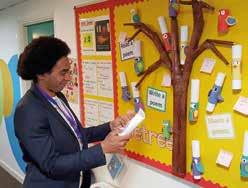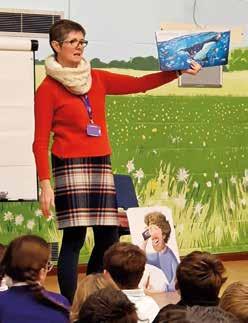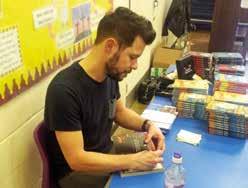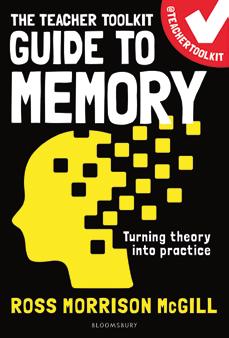
8 minute read
Jon Biddle & reviews
Jon Biddle, English lead and NEU rep at Moorlands Primary in Norfolk, is passionate about fostering a love of reading for pleasure. Here he shares ideas and tips for schools to try. Author visits on a tight school budget
“THE person who properly drew this book talked to me today in real life. She asked if I liked stories and I said I loved them,” is undoubtedly one of my favourite overheard statements of recent times. It was made by a year 2 child walking across the school playground after a draw-along session led by author and illustrator Mini Grey.
Visits by authors, poets and illustrators have a positive impact on attitudes towards reading and writing, boosting confidence and engagement. Children have gone home happily clutching a picture book signed by Liz Million and then come into school the next day desperate to write and illustrate stories of their own. Pupils who have never previously shown any interest in poetry have marched into the playground carrying armfuls of poetry books to read with their friends following a visit from our former patron of reading, Joseph Coelho.
Earlier this week, excitement levels were high when we were visited by children’s author Fiona Barker. Across the day, there were stories, quizzes, signing and singing, fascinating facts about whales, counting in Japanese, question and answer sessions, and so much more. It was a packed day, with everything geared towards promoting a love of reading, and the children and staff went home on a real high.
Fiona explained: “Going into schools is such a gift. I hope I’m able to inspire children to read more as I know what an impact it can have in all areas of their lives. But I’m also inspired by them – to read more myself, to write more, to write better. Everybody wins.”
Funding in schools has reached (and passed) crisis levels and, as always, the pupils inevitably miss out on many opportunities that would broaden their experiences. A recent study by the National Literacy Trust (NLT) showed that only one in four children will have an author visit during the school year and those from the most deprived backgrounds are more likely to miss out. Jonathan Douglas, director of the NLT, said: “We cannot overstate how important author visits are for sparking a love of reading and writing in children that will ignite their imaginations, enhance their wellbeing and transform their life chances.”

(From left) Joseph Coelho exploring Moorlands’ poetree; Fiona Barker reading with KS2 pupils; and Guy Bass signing books
PTA, charities, local bookshops
There are ways to be creative and reduce the financial pressures when organising an author visit. Much of the cost is travel and accommodation, so clusters of local schools can work together and book an author for consecutive days, saving a significant amount. Online visits are an increasingly popular option.
At Moorlands, we have two or three every year, lasting from 45 to 90 minutes, usually linked to the books we’re reading in class. We recently had a superb session from Catherine Johnson who talked to us about Black British history. We were also able to learn about her writing set-up at home and had a short glimpse into her life as an author.
It’s definitely worth making friends with your local children’s bookshop. They’ll often know when an author or illustrator is in the area, and are always very happy to support school visits. Last year, I talked to our school PTA about the importance of children meeting authors, sharing several quotes about how much they enjoyed them, and they happily agreed to contribute towards the next visit. Many charities and organisations, such as the Ernest Cook Trust, will also support with funding.
Financially, it’s going to be harder than ever for schools to engage with authors over the next few months, with many schools struggling to even keep their pupils warm during the day. But that doesn’t mean that the wider purpose of education can be forgotten.
It needs to be enriching and inspiring. It needs to broaden the children’s horizons and raise their aspirations. Writers and illustrators working alongside schools will help significantly in all these areas and, if there’s a way that we can make it happen more regularly, we need to find it. @jonnybid

Read more ideas from Jon next issue
You’ll receive great books to review and keep, plus a £30 book token each year. Email educate@neu.org.uk
A Very British Conspiracy
A VERY British Conspiracy details the 27-year campaign for justice following the wrongful prosecution of striking building workers.
Eileen Turnbull leaves no stone unturned when uncovering the series of events and collusions that led to this miscarriage of justice. Her tenacity and unwavering belief in workers’ rights leads the way and would be a thoughtprovoking read for many.
The harsh realities of working-class life in the 1970s and ’80s are laid bare, and comparisons to modern-day treatment and the threat to the right to strike are hard to ignore. An inspiring and dedicated piece of work.
Sian Collinson A Very British Conspiracy by Eileen Turnbull. Verso books. £16.99.
The Teacher Toolkit Guide to Memory
THIS informative book has a wealth of research about learning and the different kinds of memory. Chapters include an overview of the brain, how memory is shaped, and mental models for learning.
Within each section there is an explainer, indicating what the topic is about and the theory behind it. Next, there is a practical idea which shows how to adapt each concept in the classroom. This is followed by a helpful example, and a blank template that can be photocopied or downloaded. Suitable for both primary and secondary teachers.
Cindy Shanks The Teacher Toolkit Guide to Memory by Ross Morrison McGill. Bloomsbury. £12.99.

The Foster Carer’s Handbook on Education
AN excellent guide showing how to help looked-after children achieve. Recognising that these children can have emotional struggles and learning barriers, the book delivers practical advice for carers, helping them gain a greater understanding of the fostering and educational systems.
Providing facts about education from early years to post-16, Sarah Alix explains the technical jargon and the role of
supporting adults involved in a I found this handbook really useful; it’s something I wish I had read when I first became a foster carer because it covers everything you’d need to know. Katie Jones, foster carer The practical tips are excellent and empowering, for example I really like the sections on helping children with transitions and with home learning. Fiona Darlington-Black, Head of Service, Cornerways Fostering Services How can you, as a foster carer, best support the education of the children and young people in your care? Many children in foster care get on with school, enjoy it and do well, but some really struggle, their ability to cope with its demands affected by the impact of previous experiences of neglect, trauma and loss. They need understanding and extra support that is not always readily available. You know your child best, so you are likely to know whether she is settling into her new primary school or how well he is coping with the transition to secondary education. Teachers and other school staff need your guidance about how best The Foster Carer’s Handbook on Education Sarah Alix Sarah Alix With Eileen Fursland and Nicola Hill The Foster Carer’s Handbook on Education GETTING THE BEST FOR YOUR CHILD foster child’s life, such as social workers and virtual school heads. The excerpts and reallife examples are particularly useful, indicating the strategies foster carers and children to help her feel safe and understood in the classroom. This handbook aims to support you in that task and so help your child to have the best possible experience of education, right up to leaving care. have used to deal with You will find information, advice and ideas on: l l l how early experiences can affect children’s learning the legal framework – what Fostering Regulations and Standards mean for you the school system – who’s who and what they do personal challenges. An l moving between classes and school l l l special needs, exclusion and alternative provision post-16 education a summary of points at the end of each chapter indispensable resource for Throughout the book, personal accounts drawing on the experiences of foster carers, professionals and young people help to bring the topic alive. foster carers. A must for any foster carer seeking to support the children in their care through school and beyond. Cindy Shanks
£14.95
The Foster Carer’s Handbook on Education, by Sarah Alix. CoramBAAF. £14.95.
Howl Like A Wolf
THIS beautifully illustrated book helps children get to know all about 15 amazing animals – from the interestingly named bowerbird to the common honeybee.
Each section gives facts and information about the animal with illustrations and diagrams to help with the explanations. Included in this are activities which encourage children to act out things these animals do. For example, they can learn how to cool off like an elephant, balance like a penguin or even build like a beaver.
This is an interesting book which will engage children in finding out about animals in a whole new way.
Sian Sparrow Howl Like a Wolf by Kathleen Yale, illustrated by Kaley McKenna. Storey publishing. £5.77.
The Thing in the Basement
WHEN Scott passes the basement steps of his new school, he sees something flash and hears a roar. He thinks that there is something down there, but surely it can’t be a dragon… or can it?
The Thing in the Basement is part of the Bloomsbury Readers series, which was created in consultation with experts at the Centre for Literacy in Primary Education. Each book is perfect for supporting children to gain confidence with reading and understanding.
With quirky black-and-white illustrations, this mysterious adventure is sure to grab children who are developing as readers.
Aliss Langridge The Thing in the Basement by Michaela Morgan, illustrated by Doffy Weir. Bloomsbury. £6.29.










